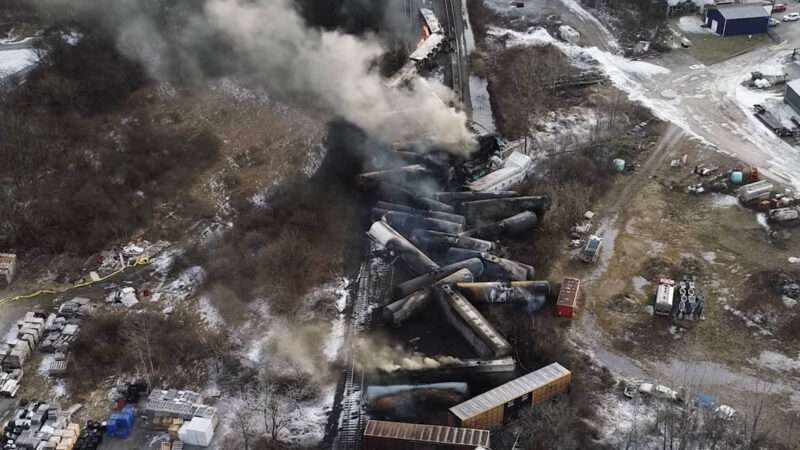
In the wake of the ugly freight train derailment in East Palestine, Ohio, last month, a bipartisan group of senators has proposed a bill they say would overhaul safety regulations for American railroads.
The bill also includes, perhaps unsurprisingly, a number of provisions that seem to have nothing to do with the cause of the Ohio accident that garnered national attention after hazmat crews conducted controlled burns of potentially toxic substances. Instead, the bill would deliver a costly new union-favored mandate to the railroad industry, making it more expensive to ship goods across the country for little (or no) safety benefit.
Tucked into the 18-page Railway Safety Act introduced by Sens. Sherrod Brown (D–Ohio) and J.D. Vance (R–Ohio) is a provision mandating that "no freight train may be operated without a 2-person crew." As Reason has previously reported, the two-person crew mandate is something railroad labor unions have been seeking for years as a way to maintain staffing levels as trains become more and more automated.
More highly automated trains are both safer and cheaper. Since the advent of positive train control (PTC)—essentially a computer-based override system that monitors speed and track signals to avert collisions, and which railroads have been mandated by Congress to use since 2008—rail accidents and employee injuries have fallen. Data from the Association of American Railroads (AAR), an industry group, show accidents are down 30 percent since 2000, while employee injuries have fallen by more than 40 percent. Meanwhile, a 2015 study by Oliver Wyman, a consulting firm, and the AAR found that switching from two-person to one-person crews could save railroads $2.5 billion over a decade.
The federal government's own railroad, Amtrak, ditched its two-person crew requirement all the way back in the 1980s. That means Vance and Brown's bill would be imposing an expensive new rule on freight trains—supposedly in the name of safety—that wouldn't apply to trains carrying passengers.
And then there's this inconvenient detail: The train that derailed in East Palestine actually had three crew members on board.
In some ways, the Railway Safety Act looks like the kinds of bills that get batted around in the aftermath of mass shootings. Those proposals often aim to place more restrictions on legal and law-abiding gun owners or prohibit cosmetic upgrades that anti-gun activists dislike, but rarely (if ever) do they address the circumstances that led directly to a tragic event.
The same seems to be true here. While the investigation into the accident is ongoing, all indications so far point to two causes that worked in tandem to derail the Norfolk Southern train in East Palestine. The primary cause was an overheated wheel bearing, which failed and caused the train to derail as the crew was attempting to bring it to a stop after being alerted to the potential problem. The secondary cause was a possible delay in getting that alert to the crew. At least one trackside sensor meant to look for overheated wheels—known as a "hotbox detector"—along the train's route did not function properly. By the time the crew was alerted to the problem, it was too late.
Hotbox detectors aren't infallible, clearly, but they've got a long track record of success. A 2019 Federal Railroad Administration (FRA) report found that "accident rates caused by axle and bearing-related factors have dropped 81 percent since 1980 and 59 percent since 1990 due to the use of [hotbox] detectors." Doubling down on that technology seems like a good bet.
In response to the derailment in East Palestine, Norfolk Southern announced plans to install more hotbox detectors along its routes. The National Transportation Safety Board and the FRA have indicated they may implement new rules for hotbox detectors and other automated trackside safety equipment—and change how crews are expected to respond to alarms from those sensors. That seems like a targeted, focused, and likely effective response to prevent another accident like this one.
By contrast, members of Congress ought to ask themselves what a two-man crew mandate would have done to prevent the derailment. If anything, the East Palestine derailment was the result of there being too little automation in the operation of freight trains, not too much.
But that's not a satisfactory answer to the political forces on either side of the aisle who favor dragging railroads backward to the times when they operated less safely and less efficiently. The White House, in a statement that notably did not mention the two-person crew mandate, says the bill is full of "commonsense rail safety measures" and encouraged Congress to pass it quickly. Conservative groups that are part of the "New Right" have signaled their support for the bill, and Vance is joined by Sens. Josh Hawley (R–Mo.) and Marco Rubio (R–Fla.) in sponsoring it.
More sensors along the tracks might have prevented the mess, but an extra union worker in the engine's cab wouldn't have saved the day—and, indeed, didn't. It makes no sense to use this accident as an excuse to pile a costly, unnecessary mandate on American railroads—but that's exactly what Biden, Brown, Rubio, and Vance seem determined to do.
The post After the East Palestine Derailment, Congress Is Trying To Force Unrelated, Costly Regulations on Railroads appeared first on Reason.com.







